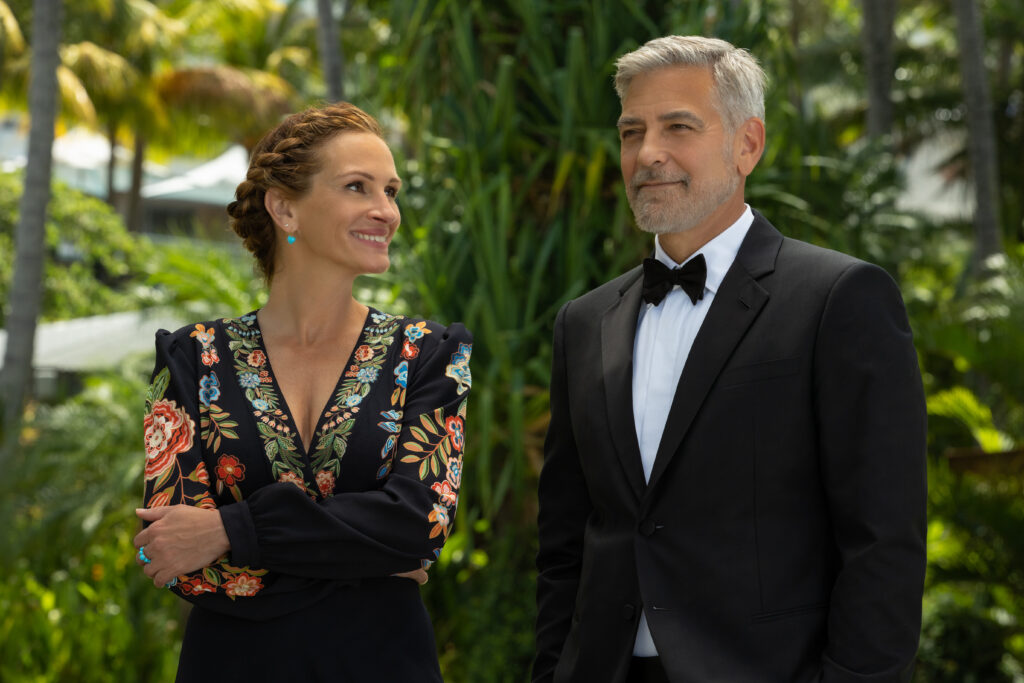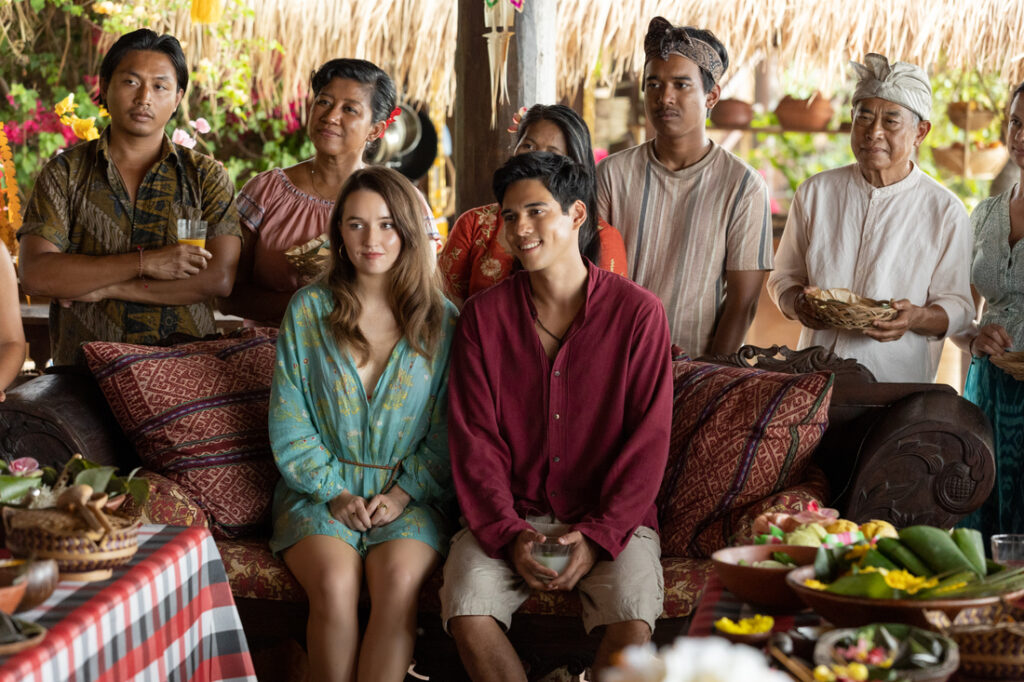October 19, 2022
by Carla Hay

Directed by Ol Parker
Culture Representation: Taking place in primarily in Bali and briefly in the United States, the comedy film “Ticket to Paradise” features a cast of white and Asian characters representing the working-class and middle-class.
Culture Clash: A bickering, divorced American couple will go to great lengths to sabotage the wedding of their young adult daughter, who has decided to abandon plans for a law career in the U.S., so that she can marry a seaweed farmer in Bali, after a whirlwind courtship.
Culture Audience: “Ticket to Paradise” will appeal primarily to people who are fans of stars George Clooney and Julia Roberts, because their chemistry on screen and skillful comedic performances are the best things about the movie.

“Ticket to Paradise” is every bit the predictable romantic comedy that it appears to be, but the on-screen chemistry and talent of stars George Clooney and Julia Roberts bring a lot of charm and appeal. The movie’s snappy banter enlivens the story. Having a skilled ensemble goes a long way in making “Ticket to Paradise” entertaining for viewers looking for a comedy that’s mostly lightweight but offers some emotional gravitas in addressing issues about family and forgiveness.
Directed by Ol Parker (who co-wrote the “The Ticket to Paradise” screenplay with Daniel Pipski), “Ticket to Paradise” gets straight to the bickering between ex-spouses David Cotton (played by Clooney) and Georgia Cotton (played by Roberts), who have been divorced for about 20 years. The movie’s opening scene shows David and Georgia explaining their bitter marital breakup, as they board separately on a plane flight to go to their daughter’s graduation from law school at an unnamed university in the United States.
David and Georgia got married 25 years ago, and their marriage lasted only five years. Their only child is a daughter named Lily (played by Kaitlyn Dever), who is now in her mid-20s. Because Lily’s parents divorced when she was too young to ever remember when her parents were happy together, all she has known is that her parents can’t stand to be in the same room together. Therefore, this family reunion is filled with tension, especially when David and Georgia are forced to sit together at events such as this graduation ceremony.
Of course, people who’ve seen enough romantic comedies already know that David and Georgia’s arguments and insults are indications that they have a love/hate relationship with a lot of unresolved issues. Those issues are eventually revealed in the movie in moments when David and Georgia show some emotional vulnerability. But in the meantime, they act like jealous and competing ex-spouses for most of the story.
After graduating from law school, Lily and her best friend Wren Butler (played by Billie Lourd), who was in the same law school graduating class, take a vacation together in Bali. (“Ticket to Paradise” was actually filmed in Australia.) Wren is a party-loving bachelorette who is loyal to Lily and has very wry observations about life. While swimming in the ocean one day, Lily and Wren find out that they swam too far away from the shore and are stranded.
But lo and behold, a handsome young man suddenly appears in a boat and comes to their rescue. He is a seaweed farmer named Gede, pronounced “ga-day” (played by Maxime Bouttier), and he’s about the same age as Lily and Wren. Gede and Lily lock eyes immediately in the way that future couples do in movies where two people are experiencing infatuation at first sight. Lily, Gede and Wren then hang out at a local bar. And the next you know, Lily has spent the night at Gede’s place.
During this fateful vacation, Gede shows Lily what he does for a living. The simplicity of his lifestyle, the beauty of Bali, and Gede being in tune with nature all have a profound impact on Lily. Lily says to Gede, “I am so out of balance.” He gazes at her lovingly and replies, “I’ll help you find it.” Yes, it’s that kind of movie.
“Ticket to Paradise” then fast-forwards to an unspecified time, which appears to be just a few months later. David and Georgia are shocked to find out that Lily is getting married in Bali to a seaweed farmer whom Georgia and David never met. Lily has also announced that she’s given up her plans to become a lawyer and will live permanently in Bali with her future husband. The wedding date has already been set.
David and Georgia might not agree on many things, but they do agree that Lily is making a huge mistake by getting married to someone she’s known for a short time and by giving up a law career. Georgia and David decide to sabotage the wedding. And somehow, David and Georgia think they might be able to convince Lily to stay in the United States and not to give up her law career too.
But on the plane flight to Bali, more discord happens when David and Georgia are dismayed to find out they have seats next to each other. It’s a problem that is temporarily resolved when a chatty and lonely passenger named Beth-Ann (played by Genevieve Lemon) offers to switch her seat so that she can sit between David and Georgia. And what a coincidence: The flight’s pilot captain just happens to be Georgia’s good-looking and very attentive French boyfriend Paul (played by Lucas Bravo), who’s about 20 years younger than she is.
The hijinks that happen in the movie are pure rom-com fluff that rely on a lot of convenient coincidences that force Georgia and David to spend as much time together as possible. Gede’s large family is very welcoming to Lily and her family, but “Ticket to Paradise” doesn’t give much realistic insight into the dynamics between Gede’s family members, who are all presented as happy people who all get along with each other. Gede’s father Wayan (played by Agung Pindha) is a bit of a jolly prankster, while Gede’s mother Suli (played by Ifa Barry) and sister Losi (played by Cintya Dharmayanti) are very pleasantly generic characters.
Even though Gede and Lily’s wedding is the main event in “Ticket to Paradise,” and the movie shows some aspects of Balinese culture, the story really isn’t about Lily, Gede or life in Bali. It’s about the antics of David and Georgia, who both can sometimes be selfish and cruel when it comes to getting what they want. Georgia and David have some zinger insults that they verbally hurl at each other and sometimes at other people, as well as some slapstick moments that will make people chuckle out loud when David and/or Georgia make fools out of themselves.
Even though some of the movie’s plot developments are a bit gimmicky, one of the most naturalistic-looking and best scenes is when David and Georgia get drunk while playing beer pong with Gede, Lily and Wren. Lily is embarrassed by her parents, of course, but it’s a scene where you can tell that the cast members genuinely had a fun time filming it. The mega-watt smiles and laughter of Roberts and Clooney have a joy that’s very infectious when watching this scene. It’s an example of how good choices in casting can make all the difference in getting a scene to shine in all the right ways.
Dever and Lourd also have believable chemistry together as best friends, even though the movie doesn’t give Wren much to do but react to a lot of zaniness that happens with Lily and her parents. Bouttier is perfectly fine as Gede, who has a few good scenes in showing that he’s smarter than David thinks he is. Bravo has a few well-performed comedic moments as Georgia’s devoted lover Paul. Predictably, David is jealous of Paul, but David tries not to let it show. Meanwhile, Georgia is jealous of David because she thinks that “daddy’s girl” Lily loves David more than Lily loves Georgia.
“Ticket to Paradise” has a breezy tone to it that never lets viewers forget that even with some emotional family baggage that’s brought up in the story, this movie is a romantic comedy, through and through. The movie’s ending will either make people roll their eyes in disbelief or smile with delight. And, if nothing else, even if some viewers don’t like the story presented in “Ticket to Paradise,” they can at least appreciate the gorgeous cinematography of the tropical settings showcased in the movie, which lives up to the “paradise” part of the title.
Clooney has played lovable grouches many times before, while Roberts is doing another version of the sassy cynicism that she’s done for many of her movie characters. But that’s what audiences want to see in this movie, and “Ticket to Paradise” delivers in that regard. Whether people like or dislike this type of romantic comedy, it’s hard to deny that Clooney and Roberts tap into some realistic mixed emotions about ex-spouses who mishandle their unresolved feelings, resulting in some cringeworthy moments intended to make people laugh.
Universal Pictures will release “Ticket to Paradise” in U.S. cinemas on October 21, 2022. The movie was released in Australia and several countries in Europe, Asia and South America in September 2022.
